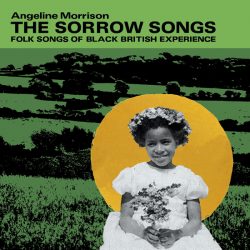An important, essential folk album which casts light on the hidden history of black people in these sceptred /blighted isles.
 On the face of it, ‘The Sorrow Songs: Folk Songs Of Black British Experience’ is an excellent collection of songs performed in a traditional English folk style with singer and writer Angeline Morrison well assisted by her producer Eliza Carthy. The songs cover most of the usual topics one might expect from a folk album. There’s birth and death, dire crimes and passion, all delivered in a very moving fashion giving Morrison the right to consider herself a peer of Carthy herself along with acts such as The Unthanks and the various Albion Bands while the appearance of Martin Carthy on one song is truly a mark of approval.
On the face of it, ‘The Sorrow Songs: Folk Songs Of Black British Experience’ is an excellent collection of songs performed in a traditional English folk style with singer and writer Angeline Morrison well assisted by her producer Eliza Carthy. The songs cover most of the usual topics one might expect from a folk album. There’s birth and death, dire crimes and passion, all delivered in a very moving fashion giving Morrison the right to consider herself a peer of Carthy herself along with acts such as The Unthanks and the various Albion Bands while the appearance of Martin Carthy on one song is truly a mark of approval.
Uniquely, Morrison has based her songs on the lives and stories of a hidden Diaspora, that of people of colour in the UK. Popular wisdom might have that there were no black people in the UK prior to the Windrush generation but, as first noted in Gretchen Gerzina’s 1995 book ‘Black England’, there is a rich history of black people on these shores going back to Roman times. Morrison, a Cornwall based folk singer and Morris dancer had looked into the folk canon for mentions of black people but pretty much drew a blank, aside from some mainly negative mentions. So she set out to research some notable examples and then proceeded to set their tales within a traditional folk setting. The album’s title is inspired by W.E.B Du Bois’ 1903 classic of African American literature, ‘The Souls of Black Folk’, which Morrison re-read after the killing of George Floyd in 2020. Chapter 14 of that book, ‘Of The Sorrow Songs,’ is all about the folk songs of enslaved Africans in America and their descendants. In the absence of any such UK folk songs, Morrison’s ‘Sorrow Songs’ are, in her own words, her “re-telling” of the lives of those whose stories she discovered.
As we said, listening to the album is a delight but it’s one which is hugely enriched (and most often saddened and angered) by Morrison’s extensive notes to the songs which fill in the details of those she sang about. The opening song, ‘Unknown African Boy’, for example, is based on a 19th century newspaper article detailing items washed up on an Isles Of Scilly shore after a shipwreck. The list includes palm oil, several hundred elephant tusks, a box of silver dollars, two boxes of gold dust, and the body of an unknown ‘West African boy’, estimated age around 8. Morrison takes this grim tale and transforms it into a beautiful and haunting lament sung from the perspective of the boy’s mother, the opening lines –“O my brown arms, they are sad and empty, O where, o where is my little son? He’s stolen away by English slavers, With a cudgel blow, and a pointed gun” are quite heartbreaking. The closing song is a masterpiece. ‘Slave No More’, sung almost acapella, with a wheezing concertina and grave chorus joining in, is based on the inscription on a grave where master and slave are buried side by side and having Martin Carthy read the inscription, the last words on the album, is a masterstroke.
Over the course of 11 songs, all of them quite remarkable and played with some excellence (by Morrison, Eliza Carthy, Cohen Braithwaite-Kilcoyne, Clarke Camilleri, Hamilton Gross, Rosie Crow, Alex Neilson and Mary Woodvine) Morrison sings of tragedy and occasional triumph as on ‘Black John’, based on John Ystumllyn (not his given name which is unknown, Ystumllyn was the estate he was indentured to) who was an 18th century slave eventually recognised as a master horticulturalist who settled successfully in Wales. Overall however, the outlook is bleak and, in a move which Morrison admits might be controversial, she adds snippets of spoken word interludes across the album, taken from interviews conducted in the 60s and 70s with white people – ever so polite but ever so racist. These are most probably folk who agreed with Enoch Powell. Morrison adds that she included these to provide some context, citing the precedent of Ewan MacColl and Peggy Seeger’s highly influential ‘Radio Ballads’. For this reviewer (who can remember people talking like this on radio and TV), the interludes are unnecessary, not in an offensive manner, rather that they intrude on the sheer beauty of the songs. However, as Morrison presumably wanted, they do remind the listener that this is not merely a folk album.
With ‘The Sorrow Songs: Folk Songs Of Black British Experience’, Angeline Morrison unveils a hidden past and does so wonderfully. The album stands comparison with that of Our Native Daughters who reclaimed the histories of black slave women in America on their album and it deserves to be in first place when the folk and roots communities start to hand out their annual awards.
https://www.youtube.com/watch?v=GBX2HrBfuWE



Excellent review – this is without any doubt one of the most important Folk albums to be released this year, not just because of the topic but because the music is so good, which is pretty important!
Thanks Jon